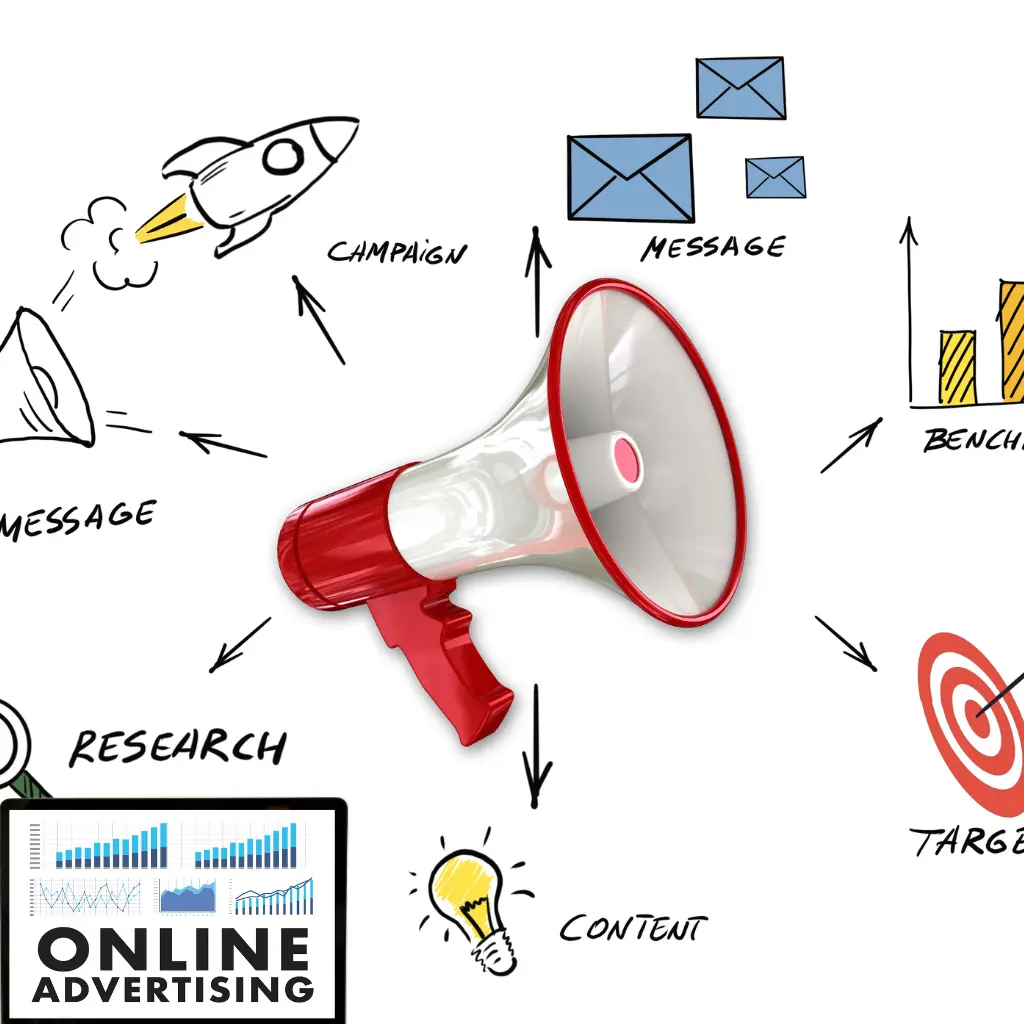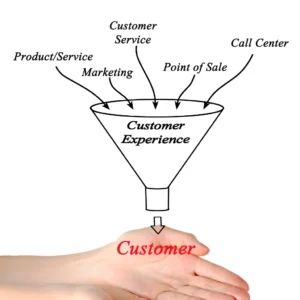
Elevate Retail Excellence
Powering Up with Dynamic AI Tools for B2C Marketing Brilliance!
This article explores the dynamic realm of Retail B2C Industry AI Tools for Marketing and Advertising, exploring a comprehensive toolset designed to enhance customer engagement, optimize campaigns, and deliver personalized experiences.
In the rapidly evolving Retail B2C industry, Artificial Intelligence (AI) integration has emerged as a transformative force, reshaping how marketing and advertising strategies are crafted and executed.
Businesses are unlocking unprecedented opportunities, from AI-driven email campaigns to chatbot-driven promotions, social media sentiment analysis, and real-time ad campaign analytics.
As we navigate the intricacies and potentials of these tools, this exploration aims to shed light on the challenges, benefits, and strategic considerations that define the landscape of AI-powered marketing and advertising in the retail sector.
Table of Contents

Arindam Roy
An Automation Consultant with 25+ years of IT Experience
AI Tool ideas for Marketing and Advertising
Building a comprehensive Retail B2C Industry AI Toolset for Marketing and Advertising requires careful consideration of each tool’s functionality and integration. Here’s a more detailed breakdown of the tools you mentioned:
AI-Enhanced Email Campaigns:
- Email Marketing Platform Integration: Seamless integration with popular email marketing platforms to streamline campaign deployment and tracking.
- Machine Learning for Personalized Content and Timing Optimization: Use machine learning to optimize emails based on user behaviour.
- A/B Testing Capabilities: Conduct A/B tests on different elements of email campaigns to identify the most effective strategies.
Segmented Customer Targeting:
- Customer Segmentation Algorithms: Implement advanced algorithms for effective segmentation based on demographics, behaviour, and preferences.
- Integration with CRM Systems and Customer Databases: Ensure seamless communication and data exchange between the segmentation tool and CRM systems or customer databases.
- Real-Time Updating of Segments Based on User Behavior: Continuously update customer segments in real-time based on their interactions and behaviours.
Chatbot-Driven Promotions:
- Integration with Chatbot Systems and Marketing Databases: Connect with chatbot systems to leverage customer interactions and integrate with marketing databases for a holistic view of customer data.
- Personalized Promotion Suggestions Based on User Interactions: Implement AI algorithms to analyze chatbot interactions and suggest customized promotions based on user preferences.
- Analytics for Measuring Chatbot-Driven Promotion Effectiveness: Track and measure the success of promotions initiated by chatbots through comprehensive analytics.
Social Media Sentiment Analysis:
- Integration with Social Media Platforms for Data Collection: Connect with major social media platforms to collect customer sentiments and discussion data.
- Sentiment Analysis Algorithms: Implement advanced algorithms to categorize social media sentiment as positive, negative, or neutral.
- Automated Response Mechanisms for Positive and Negative Sentiments: Configure automated responses for positive sentiments and notifications for negative feelings, enabling proactive engagement.
Ad Campaign Performance Analytics:
- Integration with Online and Offline Advertising Platforms: Connect with various advertising platforms to gather data on ad campaign performance.
- Attribution Models for Campaign Performance Measurement: Utilize attribution models to measure marketing touchpoint impact on customer conversions accurately.
- Real-Time Analytics Dashboards: Provide real-time analytics dashboards for a quick and comprehensive view of ad campaign performance.
Combining these tools will create a powerful AI-driven marketing and advertising toolset tailored for the highly technical and competitive retail B2C industry.
Business Knowledge Requirements
To embark on developing Retail B2C Industry AI Tools for Marketing and Advertising, a solid understanding of the non-technical aspects of the retail business is crucial. This involves understanding customer behaviours, marketing strategies, and the intricacies of managing a B2C operation.
Retail Dynamics and Customer Insights:
Understanding the retail landscape is essential. This includes recognizing the dynamics of consumer behaviour, preferences, and purchasing patterns. A deep dive into customer insights, such as what influences buying decisions and how they engage with products, forms the foundation for practical AI-driven tools.
Marketing Strategies and Campaign Management:
Comprehensive knowledge of traditional and digital marketing strategies is necessary. This encompasses awareness of how advertising campaigns are structured, the significance of targeted messaging, and the importance of adapting strategies to different consumer segments.
Customer Relationship Management (CRM):
A profound understanding of CRM systems is vital. This involves knowing how to manage customer data, segment audiences effectively, and leverage CRM functionalities for personalized marketing initiatives. A seamless integration of AI tools with CRM systems ensures a unified approach to customer interactions.
Email Marketing Best Practices:
In-depth knowledge of email marketing best practices is essential for optimizing customer engagement. This includes crafting compelling content, determining optimal send times through data-driven insights, and implementing A/B testing to refine email campaign effectiveness.
Social Media Management:
A firm grasp of social media dynamics is necessary. Understanding the impact of sentiment on brand perception, tracking social media discussions, and knowing how to respond appropriately to positive and negative feelings are critical components.
Advertising Performance Metrics:
Familiarity with advertising platforms and their performance metrics is crucial. This involves comprehending attribution models, tracking conversions, and utilizing real-time analytics dashboards to measure the success of advertising campaigns.
Legal and Ethical Considerations:
A profound awareness of legal and ethical considerations in marketing is essential. This includes compliance with data protection regulations, ensuring privacy in personalized marketing efforts, and adhering to industry standards.
Technical Knowledge Requirements
Developing Retail B2C Industry AI Tools for Marketing and Advertising demands a robust technical foundation, encompassing various aspects of programming languages, tools, platforms, and device compatibility. Let’s delve into the specific technical knowledge requirements for each component of the toolset:
AI-Enhanced Email Campaigns:
- Programming Languages: Proficiency in coding languages such as Python is crucial for implementing machine learning algorithms that optimize personalized content and timing in email campaigns.
- Frameworks and Libraries: Familiarity with machine learning frameworks like TensorFlow or PyTorch and natural language processing libraries like NLTK or spaCy is essential for developing algorithms that understand and adapt to user behaviour.
- Email Marketing Platform APIs: In-depth knowledge of the APIs of popular email marketing platforms (e.g., Mailchimp, Salesforce Marketing Cloud) is necessary for seamless integration, enabling data flow between AI tools and email marketing systems.
Segmented Customer Targeting:
- Programming Languages: Continued proficiency in languages like Python is essential for developing algorithms that dynamically segment customers based on different data points, such as demographics and behaviour.
- Integration Protocols: Understanding integration protocols, such as RESTful APIs, ensures effective communication between the segmentation tool and CRM systems or customer databases.
- Database Management: Knowledge of database systems (e.g., SQL, NoSQL) is crucial for storing and retrieving customer data efficiently, facilitating real-time updates to customer segments based on user behaviour.
Chatbot-Driven Promotions:
- Chatbot Development Platforms: Proficiency in platforms like Dialogflow or Microsoft Bot Framework is necessary for integrating chatbot systems with marketing databases.
- Natural Language Processing (NLP): A deep understanding of NLP techniques and tools is required to enable chatbots to effectively comprehend and respond to user interactions.
- API Integration: Expertly integrating APIs allows seamless communication between the chatbot, marketing databases, and AI-driven promotion suggestion algorithms.
Social Media Sentiment Analysis:
- Social Media APIs: Knowledge of APIs provided by social media platforms (e.g., Twitter API, Facebook Graph API) is crucial for collecting real-time data for sentiment analysis.
- Sentiment Analysis Tools: Proficiency in using sentiment analysis tools and libraries (e.g., TextBlob, VADER) enables categorizing social media content into positive, negative, or neutral sentiments.
- Automation Scripts: Writing automation scripts in languages like Python helps automate the retrieval of social media data and the application of sentiment analysis algorithms.
Ad Campaign Performance Analytics:
- Advertising Platform APIs: In-depth knowledge of APIs from advertising platforms (e.g., Google Ads, Facebook Ads) is vital for gathering performance data.
- Data Analytics Tools: Expertise in data analytics tools (e.g., Google Analytics, Tableau) is necessary for designing and creating real-time analytics dashboards that provide insights into campaign performance.
- Attribution Modeling Techniques: Understanding attribution models (e.g., first-touch, last-touch, multi-touch) allows for accurate measurement of the impact of different marketing touchpoints.
Technical Considerations Across Tools:
- Cross-Platform Compatibility: Ensuring compatibility with various devices and platforms is critical for delivering a seamless user experience. Responsive design and compatibility testing are vital aspects.
- Scalability and Performance Optimization: Designing the tools to handle volumes of data and user interactions requires knowledge of scalable architectures and performance optimization techniques.
- Security Measures: Implementing robust security measures, including data encryption and secure API communication, is essential to protect sensitive customer information.
Current AI Tools and Technologies available for Marketing and Advertising
The current market is rich with advanced technologies that can be leveraged to build Retail B2C Industry AI Tools for Marketing and Advertising. These technologies offer robust solutions, making it easier for developers to create innovative and effective tools tailored for the retail B2C sector.
Machine Learning and AI Frameworks:
- TensorFlow and PyTorch: These open-source machine learning frameworks provide a solid foundation for developing AI-enhanced tools, facilitating the implementation of personalized content and timing optimization algorithms.
- Scikit-learn: A versatile machine learning library in Python, Scikit-learn is valuable for building customer segmentation algorithms supporting the creation of effective targeting strategies.
Email Marketing Platforms:
- Mailchimp, Salesforce Marketing Cloud, and HubSpot: These platforms offer robust APIs that allow seamless integration with AI tools. Integration enables the development of AI-enhanced email campaigns with personalized content and A/B testing capabilities.
CRM Systems:
- Salesforce, HubSpot CRM, and Zoho CRM: Integrating AI tools with these CRM systems enables efficient customer data management and segmentation, ensuring real-time updates based on user behaviour.
Chatbot Development Platforms:
- Dialogflow, Microsoft Bot Framework, and Rasa: These platforms provide ready-to-use tools for integrating chatbots into marketing strategies, allowing personalized promotion suggestions and effective user interactions.
Social Media Integration and Sentiment Analysis Tools:
- Twitter API, Facebook Graph API, and Instagram Graph API: Integration with these social media APIs allows for real-time data collection, essential for sentiment analysis.
- TextBlob and IBM Watson: These sentiment analysis tools enable the automated categorization of social media content, providing valuable insights into customer sentiments.
Advertising Platforms:
- Google Ads, Facebook Ads, and LinkedIn Ads: APIs from these advertising platforms offer data on ad campaign performance, supporting analytics integration for measuring effectiveness and attribution modelling.
Analytics and Dashboard Tools:
- Google Analytics and Tableau: These tools provide robust analytics capabilities, allowing developers to design real-time analytics dashboards for tracking and measuring the performance of various marketing campaigns.
Cloud Services:
- Amazon Web Services (AWS), Microsoft Azure, and Google Cloud Platform (GCP): Leveraging cloud services facilitates scalable and secure deployment of AI tools, ensuring optimal performance and data storage.
Natural Language Processing (NLP) Libraries:
- NLTK, spaCy, and GPT Models: These libraries and models assist in implementing natural language processing for chatbots, enabling them to understand and respond effectively to user interactions.
Security Solutions:
- SSL/TLS Encryption and OAuth: Implementing SSL/TLS encryption ensures secure communication, while OAuth provides secure API access, addressing critical security concerns in handling customer data.
Technical Integrations Requirements
Once the Retail B2C Industry AI Tools for Marketing and Advertising have been developed, seamless integrations with various systems and platforms are essential to ensure effective deployment and functionality. These integrations enhance the toolset’s capabilities, enabling it to interact with existing infrastructures and deliver a comprehensive solution tailored to the retail B2C sector.
Email Marketing Platform Integration:
- API Integration: After building AI-enhanced email campaigns, integrating the toolset with popular email marketing platforms like Mailchimp or Salesforce Marketing Cloud is crucial. This involves utilizing the platforms’ APIs to enable smooth data exchange and automated campaign deployment.
- User Authentication: Implementing secure user authentication ensures the AI toolset can access and interact with the email marketing platform securely, maintaining data integrity and user privacy.
CRM Systems and Customer Databases:
- Data Synchronization: Seamless integration with CRM systems like Salesforce or HubSpot CRM is vital for customer segmentation. Data synchronization mechanisms ensure customer information is up-to-date across the AI toolset and CRM, enabling accurate segmentation.
- Real-time Updates: Establishing real-time communication between the AI toolset and CRM systems ensures that customer segments are updated based on the latest user behaviour, creating a more responsive and adaptive marketing approach.
Chatbot Systems and Marketing Databases:
- Chatbot API Integration: Integrating the toolset with chatbot systems like Dialogflow or Microsoft Bot Framework requires API integration. This connection enables data exchange between the AI toolset and chatbots for personalized promotion suggestions.
- User Interaction Data Exchange: Ensuring that user interactions captured by chatbots are seamlessly communicated to the marketing databases enhances the toolset’s ability to analyze user behaviour and provide relevant promotions.
Social Media Platforms:
- Social Media API Integration: Connecting the AI toolset with social media platforms, for instance, Twitter, Facebook, or Instagram, involves integrating their respective APIs. This integration allows the toolset to collect real-time data for sentiment analysis.
- Automated Response Mechanisms: Implementing automated response mechanisms based on sentiment analysis results ensures timely and appropriate responses to positive and negative sentiments on social media, actively managing brand perception.
Online and Offline Advertising Platforms:
- Advertising Platform API Integration: Integrating online and offline advertising platforms, for example, Google Ads or Facebook Ads, is essential for ad campaign performance analytics. Utilizing their APIs enables the toolset to gather data on campaign performance.
- Attribution Model Implementation: Implementing attribution models within the toolset requires integrating with advertising platforms to retrieve accurate data on customer touchpoints. This integration is crucial for measuring the impact of different marketing channels.
Real-time Analytics Dashboards:
- Analytics Tool Integration: Integrating the AI toolset with analytics tools like Google Analytics or Tableau ensures that real-time analytics dashboards can be created. This integration provides a centralized view of marketing performance across various channels.
- Data Visualization: Implementing effective data visualization techniques within the dashboards enhances the toolset’s usability, allowing stakeholders to quickly interpret and act upon the insights provided by the analytics.
Training Needs for Staff Managing on AI Tools for Marketing and Advertising
Implementing Retail B2C Industry AI Tools for Marketing and Advertising tools requires a thoughtful training program to empower existing staff with the necessary skills and knowledge. The unique nature of these tools, integrating advanced AI and marketing strategies, demands a specialized training approach to ensure effective utilization and optimization.
Technical Training:
- Machine Learning and AI Basics: Staff members should receive training on machine learning and AI fundamentals, emphasizing the specific algorithms and models used in the developed tools. This foundational knowledge is crucial for understanding how AI enhances marketing and advertising efforts.
- Tool-specific Training: A deep dive into the technical aspects of the developed tools is essential. This includes training on using the AI-enhanced email campaign features, understanding segmentation algorithms, and proficiency in leveraging chatbot-driven promotions. Practical sessions can be beneficial for hands-on experience.
Platform Integration Training:
- Email Marketing Platform Training: Staff should be familiarized with the integrated email marketing platforms (e.g., Mailchimp, Salesforce Marketing Cloud) to deploy and manage campaigns efficiently. Training on utilizing the platform’s features with AI tools ensures a seamless workflow.
- CRM System Training: Understanding CRM systems (e.g., Salesforce, HubSpot CRM) is critical for effective customer segmentation. Staff should learn to navigate and utilize the CRM features integrated with the AI tools to ensure accurate and dynamic segmentation.
- Chatbot System Training: Training on chatbot development platforms (e.g., Dialogflow, Microsoft Bot Framework) is necessary for staff managing chatbot-driven promotions. This includes understanding how to configure chatbot responses and interpret user interaction data.
Social Media and Advertising Training:
- Social Media Platform Training: Staff should be trained on social media (for example, Twitter and Facebook) to collect data for sentiment analysis effectively. Training to interpret social media analytics and respond to sentiments is crucial for managing the brand’s online presence.
- Advertising Platform Training: Understanding the advertising platforms (e.g., Google Ads, Facebook Ads) is vital for staff responsible for measuring ad campaign performance. Training on implementing attribution models and interpreting campaign analytics ensures effective decision-making.
Analytics and Reporting Training:
- Analytics Tool Training: Staff should be proficient in using analytics tools (e.g., Google Analytics, Tableau) to navigate real-time dashboards. Training on interpreting analytics data helps in making data-driven marketing decisions.
- Data Visualization Training: Training on creating and understanding data visualizations within the analytics dashboards is crucial. This empowers staff to effectively communicate insights to stakeholders and make informed marketing strategy adjustments.
Security and Compliance Training:
- Data Security Training: Given the sensitivity of customer data, staff should undergo training on data security measures, including encryption and secure API communication, to prevent potential breaches.
- Compliance Training: Training on legal and ethical considerations, including compliance with data protection regulations, ensures that staff is aware of and adheres to industry standards, mitigating risks associated with non-compliance.
Challenges and Workarounds on AI Tools for Marketing and Advertising
Data Quality and Integration Challenges
Challenge:
More data quality can be needed to improve the effectiveness of AI tools. Accurate or complete customer data can lead to good segmentation and personalized marketing efforts.
Workaround:
Implement rigorous data cleaning processes and validation mechanisms. Regularly audit and update customer databases to ensure data accuracy. Establish clear protocols for integrating AI tools with existing systems, ensuring seamless data flow.
Privacy Concerns and Regulatory Compliance
Challenge:
Using customer data for personalized marketing raises privacy concerns and demands compliance with data protection regulations (e.g., GDPR, CCPA).
Workaround:
Prioritize data anonymization and encryption. Implement robust consent mechanisms and keep staff well-informed about compliance requirements. Regularly update the tools to align with evolving regulations, ensuring a proactive approach to privacy and compliance.
Technical Skill Gaps
Challenge:
Existing staff may need more technical expertise to effectively manage and optimize AI tools.
Workaround:
Invest in targeted training programs, providing staff with technical skills. Leverage external training resources, workshops, and online courses. Encourage a culture of continuous learning of evolving technologies.
Integration Complexity
Challenge:
Integrating AI tools with existing platforms, such as email marketing and CRM systems, can be complex and time-consuming.
Workaround:
Engage experienced integration specialists or utilize pre-built connectors provided by platforms. Conduct thorough testing to identify and address integration issues early in deployment. Collaborate closely with platform providers to streamline integration workflows.
Adapting to Dynamic Consumer Behavior
Challenge:
Consumer behaviour constantly evolves, making it challenging to create algorithms that accurately predict and respond to changing preferences.
Workaround:
Implement continuous monitoring and refinement of algorithms based on real-time data. Regularly update machine learning models to adapt to shifting consumer trends. Encourage staff to stay informed about market dynamics and contribute insights for algorithm optimization.
Balancing Automation and Personalization
Challenge:
The right balance between automated processes and personalized interactions can take time and effort.
Workaround:
Implement a phased approach, gradually increasing automation while monitoring customer feedback and engagement. Use A/B testing to fine-tune automated processes. Allow for manual intervention in critical customer interactions to maintain a personalized touch.
Ensuring Chatbot Effectiveness
Challenge:
Chatbots may need help understanding nuanced user queries, leading to suboptimal promotional suggestions and customer interactions.
Workaround:
Implement Natural Language Processing (NLP) improvements to enhance chatbot comprehension. Provide options for users to transition to human assistance when needed seamlessly. Regularly update chatbot scripts based on user feedback and emerging trends.
Measuring True Campaign Impact
Challenge:
Attributing the impact of marketing campaigns accurately across various touchpoints can be challenging.
Workaround:
Implement advanced attribution models, combining both online and offline data. Leverage machine learning algorithms to analyze complex customer journeys. Utilize integrated analytics tools to provide a holistic view of campaign performance.
Cost and Benefits of AI Tools designed for Marketing and Advertising
Costs:
- Development and Implementation Costs: Developing sophisticated Retail B2C Industry AI Tools for Marketing and Advertising involves high upfront costs. Hiring skilled developers, data scientists, and AI specialists and investing in necessary technologies and tools contribute to the initial expenditure.
- Integration Expenses: Integrating the AI tools with existing platforms, such as email marketing systems, CRM, and advertising platforms, may incur additional costs. This includes fees for utilizing third-party APIs, employing integration specialists, and ensuring seamless compatibility.
- Training Costs: Training existing staff to effectively manage and optimize the AI tools requires investment in educational programs, workshops, and external training resources. This ensures the team is equipped with the technical knowledge and skills needed for proficient tool utilization.
- Maintenance and Updates: Regular maintenance and updates are critical to keep the AI tools efficient and secure. Ongoing costs include software updates, security measures, and addressing technical glitches that may arise during operation.
Benefits:
- Improved Marketing ROI: AI-driven tools enhance marketing strategies by providing personalized content, optimizing timing, and improving targeting. This results in greater customer engagement, improved conversion rates, and favourable ROI.
- Enhanced Customer Experience: Personalization through AI tools contributes to a more tailored and enjoyable customer experience. Chatbots offer real-time assistance, and personalized promotions create a sense of individualized attention, fostering customer loyalty and satisfaction.
- Increased Efficiency: Automation of routine tasks, such as email campaign deployment and segmentation, significantly increases operational efficiency. AI tools can swiftly handle large datasets and complex processes, allowing marketing teams to focus on strategic decision-making.
- Accurate Analytics and Measurement: AI tools provide advanced analytics capabilities, allowing businesses to measure marketing campaign performance accurately. Attribution models, real-time dashboards, and in-depth insights enable data-driven decision-making and optimization for better results.
- Dynamic Adaptability: The ability of AI tools to adapt to changing consumer behaviour and market trends is a substantial benefit. These tools continuously learn and evolve, ensuring marketing strategies stay relevant and effective in the dynamic B2C landscape.
- Cost Savings Over Time: Increased efficiency, improved targeting, and higher conversion rates contribute to cost savings, making the tools a strategic investment.
- Competitive Advantage: Implementing AI tools in marketing and advertising provides a competitive edge in a saturated market. Businesses can stay ahead by delivering more personalized and effective campaigns, creating a distinctive brand image.
- Brand Reputation and Customer Trust: Using AI tools for personalized interactions and timely responses enhances brand reputation. Customers appreciate the tailored experiences, leading to increased trust and loyalty, invaluable assets in the competitive retail B2C industry.
Conclusion
In conclusion, the journey into the Retail B2C Industry with AI Tools for Marketing and Advertising is an exciting venture filled with opportunities and challenges. The comprehensive toolset discussed, comprising AI-enhanced email campaigns, segmented customer targeting, chatbot-driven promotions, social media sentiment analysis, and ad campaign performance analytics, offers a holistic approach to navigating the dynamic landscape of retail marketing.
Despite the challenges, such as data quality concerns, privacy issues, and the need for staff training, the benefits of embracing these AI tools are compelling. Improved marketing ROI, enhanced customer experiences, increased operational efficiency, accurate analytics, dynamic adaptability to changing consumer behaviour, cost savings over time, competitive advantages, and fortified brand reputations are all compelling reasons for businesses in the retail B2C sector to invest in these tools.
The cost considerations, including development, integration, training, and ongoing maintenance, should be considered strategic investments in the business’s long-term success. As the retail industry continues to evolve, the adaptability and personalized touch offered by AI tools become advantageous and essential for staying competitive.
Retail B2C Industry AI Tools for Marketing and Advertising empower businesses to connect with customers deeply, anticipate needs, and deliver personalized experiences that foster loyalty. The amalgamation of technology, data-driven insights, and strategic marketing initiatives positions businesses at the forefront of innovation, providing them with the tools to thrive in the ever-evolving and competitive retail B2C landscape. As we embark on this journey, the fusion of human creativity with AI capabilities promises a future where marketing and advertising are not just tools but experiences that resonate with each customer.
Related Articles
- AI Automation Tools in Brick-and-Mortar Retail Store
- AI Tools for Retail B2C Industry
- AI Tools for Customer Feedback and Support in Retail B2C
- AI Tools for Fraud Prevention and Security in Retail B2C
- AI Tools for Sales and Conversion Optimization in the Retail B2C
- AI Tools for Customer Loyalty and Retention in Retail B2C
- AI Tools for Analytics and Reporting in Retail B2C Industry
- AI Tools for Product Management and Innovation in Retail
- AI Tools for Supply Chain Visibility and Optimization in Retail
- AI Tools for Customer Experience and Engagement in Retail
- AI Tools for Inventory and Supply Chain Management for Retail
- AI in Retail Customer Experience























